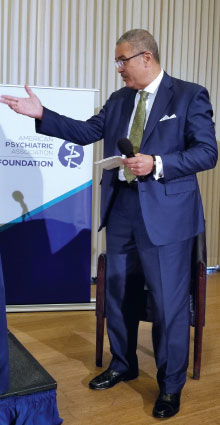APA Foundation Cohosts Panel Discussion on Philanthropy and Social Narratives
Abstract
On November 13, 140 nonprofit, fundraising, and communications leaders gathered at the National Press Club in Washington, D.C., for a panel discussion about how community philanthropy can help counter the ill effects of divisive national discourse. The APA Foundation, Graham-Pelton Consulting, and public relations firm Fenton sponsored the discussion, with APA Foundation Executive Director Daniel H. Gillison Jr. and Graham-Pelton President and CEO Elizabeth Zeigler moderating.

APA Foundation Executive Director Daniel H. Gillison Jr. encourages panelists to share their experiences in community philanthropy.
The discussion featured five panelists from disparate philanthropic organizations: Delia de la Vara of UnidosUS, Nona Evans of the Whole Kids Foundation, Sheryl Hughes of the Chicago Community Trust, Will Shafroth of the National Park Foundation, and Lilly Weinberg of the Knight Foundation. Panelists spoke of how community-based philanthropy can help heal the wounds of a society polarized by opinion bombardment in social media and other communications channels. They emphasized that relationship-building and seeking out commonalities within communities, among neighborhoods, and between individuals can counter the divisiveness of national and political discourse.
Gillison noted key statements Shafroth made during the discussion.
“To Will’s point, when you go to a park, you don’t know if the other people there are Democrats, Republicans, or Independents. But you do know they are there to enjoy the park. This was about what we have in common with one another, rather than our differences,” Gillison said.
“To create change, you have to do it at the local level. You can’t control what’s happening at the national level,” Gillison added. “This event was for not-for-profits looking to make a difference where people live, learn, work, and worship. They were there to collect insight into what they could be doing more of and taking the time to learn and hear.” ■



